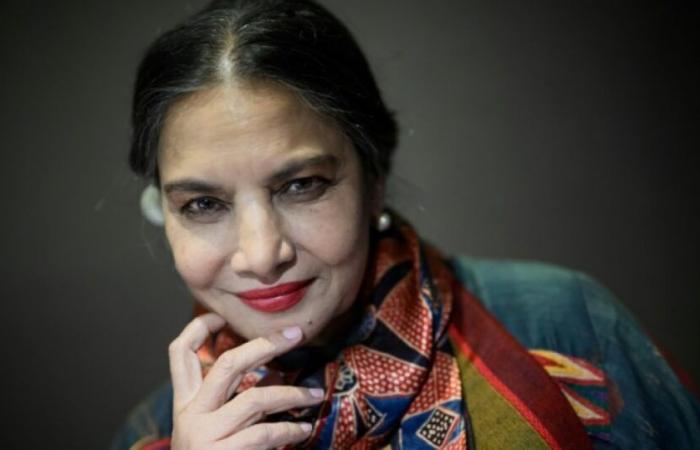Cinema helps create a “climate of sensitivity” in society in which questions and political changes can take root, says Shabana Azmi, star of Indian cinema and activist, in an interview with AFP.
“Cinema has the capacity to create a climate of sensitivity in which change can occur. A film, a book, a painting cannot change the world on its own but can begin a process of questioning in the public. And it’s the beginning,” explains the 74-year-old actress, to whom the Nantes Three Continents festival paid tribute this week.
A white flower stuck in her bun, dressed in silk, Shabana Azmi says she is “delighted” by this tribute and “touched” by the enthusiasm her films arouse.
The room was packed on Wednesday morning for the screening of “Ankur”, by Shyam Benegal, his very first film released in 1974, emblematic today of “parallel cinema”, the new Indian wave.
She plays a young village girl who begins a relationship with the son of a rich landowner after the disappearance of her husband.
Reflecting, among other things, on castes and feudalism, the film “still resonates today,” said Shabana Azmi in the introduction.
The actress represents in India “a legend, at the crossroads of Catherine Deneuve and Jeanne Moreau”, explains Jérôme Baron, artistic director of Trois Continents.
– Controversial –
In her 50-year career, Shabana Azmi has appeared in more than 160 films, both blockbusters and independent feature films, placing her social commitment at the heart of her choices and her acting.
Released in 1996, the film “Fire”, in which her character leaves her husband for her sister-in-law, sparked considerable controversy in the country.
When it was released in theaters, Hindu nationalist activists attacked several cinemas. The film was banned a few weeks after its release, before being authorized again.
“At the time, this subject (love between two women) was never discussed. When I made the film, I knew it would create controversy. That some people would be upset, others delighted that their voice would finally be represented, that some would be disturbed, but also that a process of questioning would begin, which for me is the summit,” explains the actress.
Involved since her beginnings, Shabana Azmi was, in parallel with her acting career, a member of the upper house of the Indian parliament between 1997 and 2003.
“I was able to bring the voice of the people to the very place where policies are engaged, on health, housing, women’s rights,” remembers Shabana Azmi.
– “Human compassion” –
Daughter of the Urdu poet Kaifa Azmi, the actress grew up in Mumbai, in a communist community of eight families.
“I have very good memories, the people there were poets, thinkers, idealists. They were committed to social justice and equality between men and women. I drew my values from them , that of human compassion and concern for the less privileged,” she says.
Shabana Azmi is today president of the NGO founded by her father, the “Mijwan Welfare Society”, committed in India to social and economic equity and which focuses on young girls’ access to education. .
Her political commitment and her film career are, according to her, inseparable and have been nourished over the years.
“For me it is not possible that a sensitive actor could play the role of a person who fights against injustice all day long and go home, in the comfort of air conditioning, and say to himself: I have nothing to do with these people,” she said.
But when asked if she thinks every film should have a political significance, she answers without hesitation: “No.”
“Everyone has the right to do what they want to do. I would never act in a film that casts a degrading light on women. I would prefer that people didn’t do it, but some people want to .If you deprive people of that choice, then you are a dictator.”






